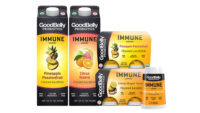CATEGORY INSIGHTS: IMMUNITY
Immune Health, Consumer Demand and Food R&D Innovation
Food and beverage product developers continue to identify specialty ingredients in an effort to shape formulations that address general health and immunity objectives

ICONIC offers a line of products that specifically target immune health. Products include ready-to-drink coffees as well as powder coffees.

Citrus Manuka Honey Immunity Gummies are for busy families looking for a safe and effective immunity boost. The fruit gummies are made without cane sugar, corn syrup, glucose or artificial sweeteners.

PSILLI uses a variety of mushroom types to create five distinct formulations: Brain Boost to support cognitive and immune function; Study Buddy, a Nootropic supplement; Energizer, a natural energy enhancer; Good Mood a mood optimizer and appetite moderator; and Bedtime, for relaxing.

Immune Support Ground Coffee is a medium roast mushroom coffee that doubles as a daily bodyguard. This brew features a base of premium organic coffee with four immune supporting ingredients: Chaga mushrooms, Vitamin D, Zinc, and Turkey Tail.

Immunity Blueberry Clementine powered by Vitamin D3 and 300mg mushrooms is made with 100% of the recommended daily amount of vitamin D, derived from algae and easily absorbed by the body to support cellular and brain health.

REBBL added immunity support to its top flavors: Reishi Chocolate, Turmeric Golden-Milk, Vanilla Protein and Dark Chocolate Protein. REBBL’s immune support comes from an added ingredient, baker's yeast beta-glucan, which is flavorless and generally recognized as safe.






The recent boom in natural health is driving consumer interest in better-for-you plants.
As consumers continue to recognize the important place of digestive health in immunity and cognitive and emotional health, their appetite for food formulations that offer gastrointestinal benefits grows. As better-for-you food and beverage formulators strive to stay up to date on new ingredients in the pipeline, it’s worth a brief look at a few key ingredients expected to trend in the coming year and beyond.
The polyphenolic compound curcumin, found primarily in turmeric, has long been recognized for myriad health benefits, ranging from antioxidant and anti-inflammatory properties to antidiabetic effects and hepatoprotective mechanisms. But while curcumin is nothing new to food formulations, emerging research has investigated its bioavailability and effects on gut microbes, with surprising results.

With immunity forefront in the minds of today's consumers, its connection to digestive health spells unprecedented options for nutrition support.
PHOTO COURTESY OF: Functional Products Trading SA/Benexia
According to recent research, one in four people globally has become more concerned about their immune health since before the pandemic. The most significant increase was among Millennials (aged 26 to 35 years) and younger Gen X (aged 36 to 45 years). Higher levels of concern among these relatively young age groups indicate the potential for longer-term consumer interest.
Immune health claims were already trending upward before COVID-19, particularly in Europe and North America. It was one of the fastest-growing health claims in food and beverage globally in terms of the number of new product launches between 2016 and 2020.

The recent boom in natural health is driving consumer interest in better-for-you plants.
PHOTO COURTESY OF: Australian Carob Co.
The natural ingredient “greatest hits” for immunity are not easy to miss, as they have become some of the top-selling botanicals. A recent review article detailed the botanicals with documented immunomodulatory, immunostimulatory, and anti-inflammatory activity that stand out for their use in immunity.
Included in this review were adaptogens; Boswellia (Boswellia frereana), also known as frankincense; turmeric (Curcuma longa), the most common source of curcumin; Echinacea (Echinacea purpurea); licorice (Glycyrrhiza glabra); umckaloabo, also known as the South African geranium (Pelargonium sidoides); a veritable library of medicinal mushrooms; and elderberry (Sambucus nigra). Elderberry, with evidence of virus-fighting ability, has recently landed at the top of the immunity list.
Looking for a reprint of this article?
From high-res PDFs to custom plaques, order your copy today!











